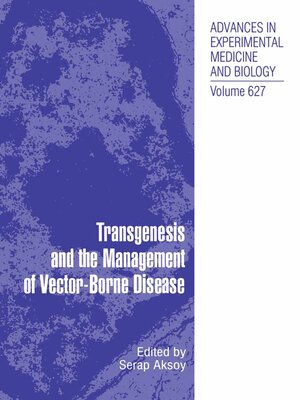Transgenesis and the Management of Vector-Borne Disease
ebook ∣ Advances in Experimental Medicine and Biology
By Serap Aksoy

Sign up to save your library
With an OverDrive account, you can save your favorite libraries for at-a-glance information about availability. Find out more about OverDrive accounts.
Find this title in Libby, the library reading app by OverDrive.



Search for a digital library with this title
Title found at these libraries:
| Library Name | Distance |
|---|---|
| Loading... |
Parasitic, bacterial and viral agents continue to challenge the welfare of humans, livestock, wild life and plants worldwide. The public health impact and financial consequences of these diseases are particularly hard on the already overburdened economies of developing countries especially in the tropics. Many of these disease agents utilize insect hosts (vectors) to achieve their transmission to mammals. In the past, these diseases were largely controlled by insecticide-based vector reduction strategies. Now, many of these diseases have reemerged in the tropics, recolonizing their previous range, and expanding into new territories previously not considered to be endemic. Habitat change, irrigation practices, atmospheric and climate change, insecticide and drug resistance as well as increases in global tourism, human traffic and commercial activities, have driven the reemergence and spread of vector borne diseases. While these diseases can be controlled through interventions aimed at both their vertebrate and invertebrate hosts, no effective vaccines exist, and only limited therapeutic prospects are available for their control in mammalian hosts. Molecular technologies such as transgenesis, which is the subject of this book, stand to increase the toolbox and benefit disease management strategies.







